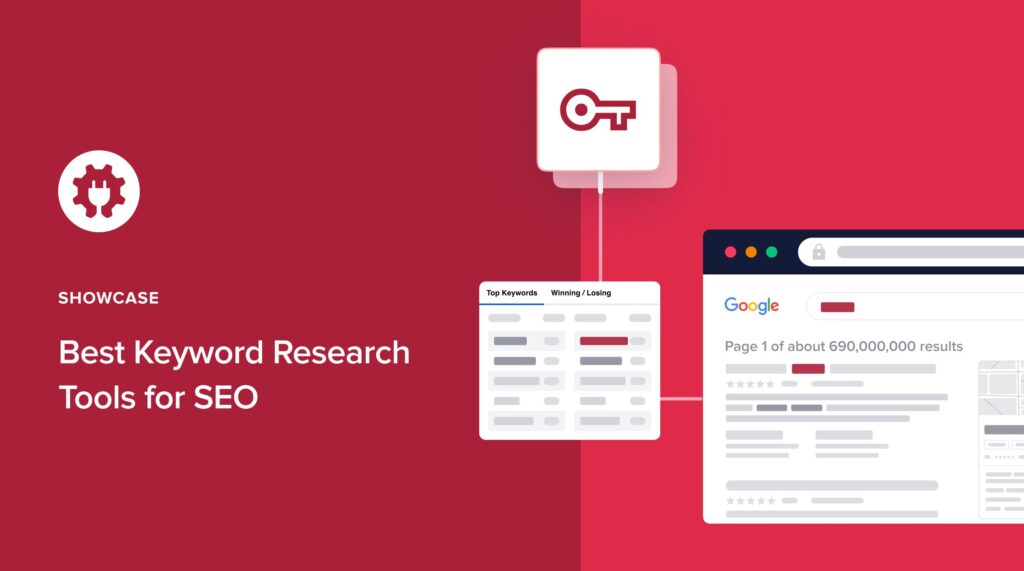The best keyword research tools help you create content that drives traffic and sales.
These tools are also a must-have for link-building and outreach, too.
For those serious about increasing mindshare or market share, a compelling strategy requires keyword research.
Below, we’ve listed curated picks for the best keyword research tools and several free tools.
First, we’ll explain what keyword research tools are.
In This Article
What Are Keyword Research Tools?
Keyword research tools are software products that provide data on search terms, backlinks, and keyword rankings.
These tools help users analyze competitors, plan content, and measure progress.
Types of Keyword Research Tools
Keyword research tools vary in their comprehensiveness and focus.
Full-featured tools, like Ahrefs and Semrush, provide in-depth keyword data, including backlinks analysis, estimated search volumes, keyword difficulty scores, and keyword intent labels.
You use these tools to find relevant keywords that are easy to rank for and to track your site’s rankings.
Narrow tools: These tools focus on narrow aspects of keyword research, like listing People Also Ask questions or Google autocomplete phrases. Examples of the latter are AlsoAsked and AnswerSocrates.
Boutique tools: Lastly, there are boutique tools for advanced practitioners. An example is Link Research Tools, which specializes in in-depth analysis of backlinks and is used by professionals involved in complex link building.
Free vs. Paid tools: In our recommendations below, we’ve included paid and free tools. Unlike Google tools, many free keyword research tools provide minimal features and require upgrading to a paid plan to unlock more.
Features to Look For in Keyword Research Tools
If you want to use content to drive organic traffic and gain market share from competitors, then choose a full-featured keyword research tool that includes the following.
- Monthly search volume
- Backlink analysis
- Keyword difficulty rating
- Keyword idea generator
- Keyword intent labels
- Keyword gap analysis
You’ll also want to be able to filter results by keyword intent, keyword difficulty, organic position, and more.
And that brings us to our top recommendations.
Best Full-Featured Keyword Research Tools
Our first 2 picks for best keyword research tools are Ahrefs and Semrush.
These competing tools have many similarities, so your choice may come down to which interface you prefer.
Ahrefs: Plan Content that Ranks
Ahrefs is an industry-leading keyword research tool popular with marketers and SEO professionals.
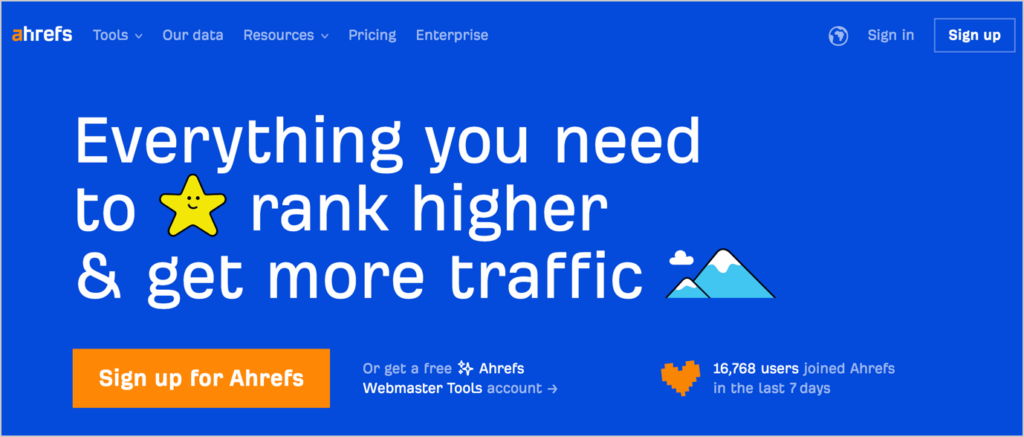
The interface is simple and intuitive, so beginners can quickly get up to speed.
Enter a keyword, and you’ll see its keyword difficulty score, estimated monthly search volume, and traffic potential.
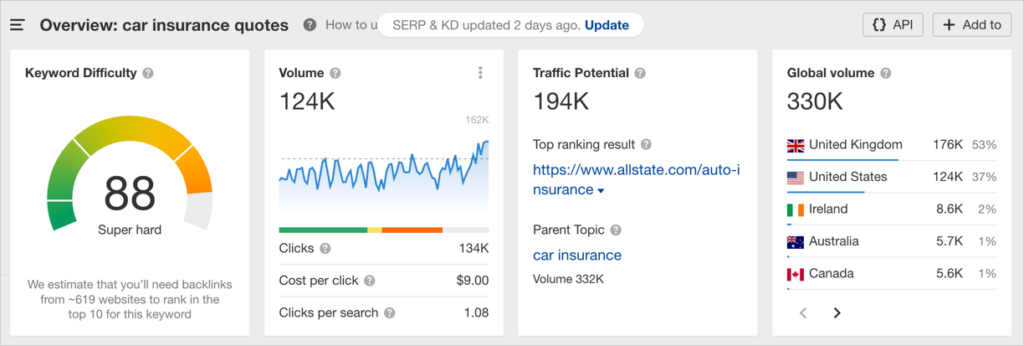
You’ll find everything you’d expect from a full-featured keyword research platform, including a keyword explorer, competitor analysis, organic keyword rankings, and backlinks analysis.
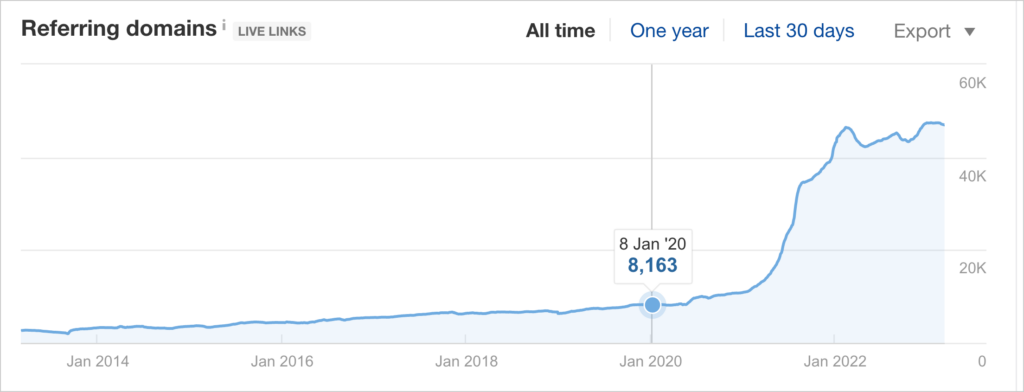
[Note: the Ahrefs Keyword Explorer is similar to Semrush’s Keyword Overview.]
Like Semrush, Ahrefs labels keywords according to search intent: Informational, Navigational, Commercial, or Transactional.
Ahrefs makes it easy to find relevant keywords that are easy to rank for.

In addition, Ahrefs assigns a Business Potential Score to each keyword. The number, between 1-3, indicates how easy (or hard) it would be to successfully pitch your product by creating content based on that keyword.
The Business Potential Score is unique and provides a helpful way for content planners to prioritize topics.
Also, Ahrefs’ Keyword Explorer allows you to select results from Google, Bing, Amazon, YouTube, or Yandex.
Select features:
- Content Gap analysis
- Traffic and ranking data
- Backlinks analysis
Ahrefs pricing: Starts at $99/month for 1 user.
Semrush: Find Valuable Keywords
Semrush is more expensive than Ahrefs, but you can pay monthly and cancel at any time.
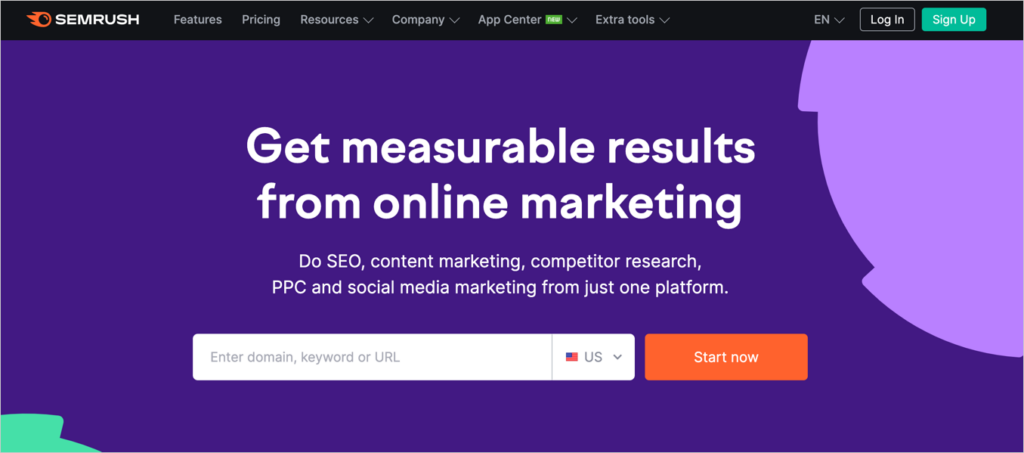
Like Ahrefs, Semrush provides monthly search volume data, backlinks analysis, and a content gap feature (called “Keyword Gap”).
It also provides the expected keyword difficulty and intent labels and search volume data.
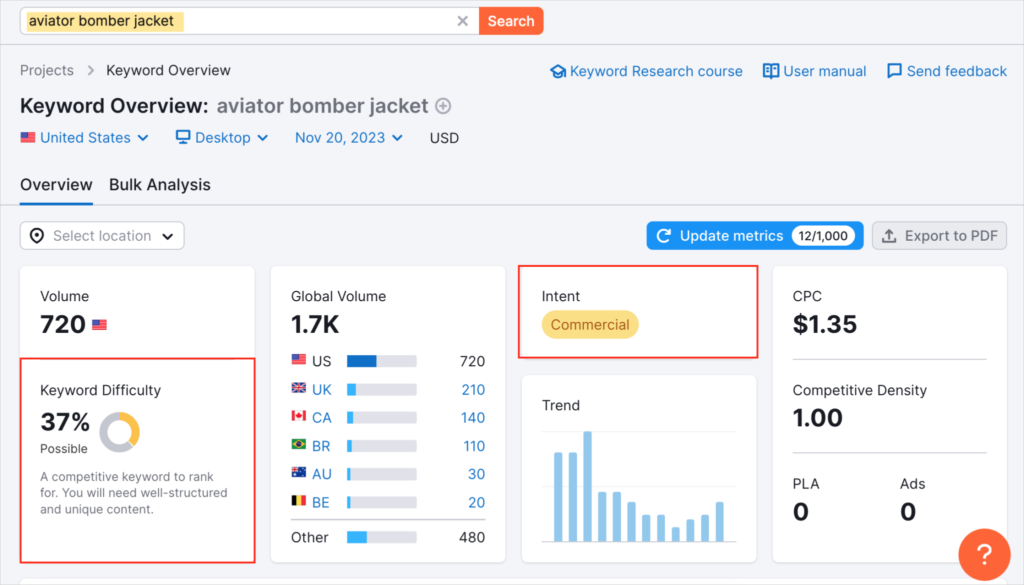
One of our favorite features of Semrush is the Keyword Magic Tool. Add a keyword, and you’ll get an instant list of related keywords.
Using the generous number of filters, you can narrow down your Keyword Magic results to keywords that are easy to rank for and have Commercial or Transactional intent.
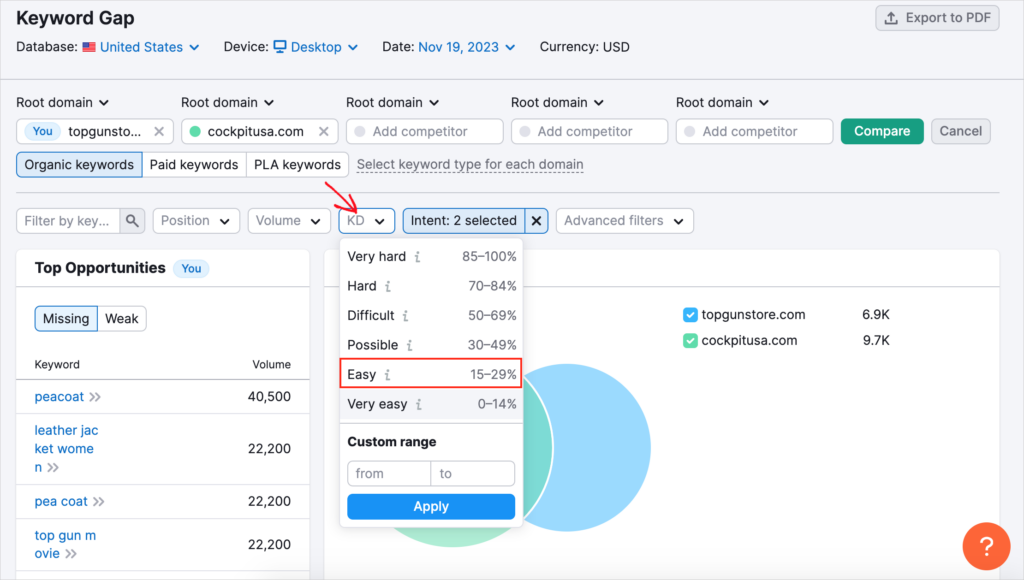
The results also display CPC (cost-per-click) data and estimated monthly search volume.
Semrush also includes a Link Building tool, which provides link suggestions based on keywords you want to rank for.
Select features:
- Keyword Gap analysis
- Backlink audit
- Bulk link analysis
Semrush pricing: Starts at $129.95/month for 1 user.
Ubersuggest: Budget Price, but Full-Featured
Like Ahrefs and Semrush, Ubersuggest is a full-featured keyword research tool. It differs in that it costs significantly less than the leading tools and it comes in a free version.
But because the free version is limited to 3 daily searches, it’s really more like an extended free trial.
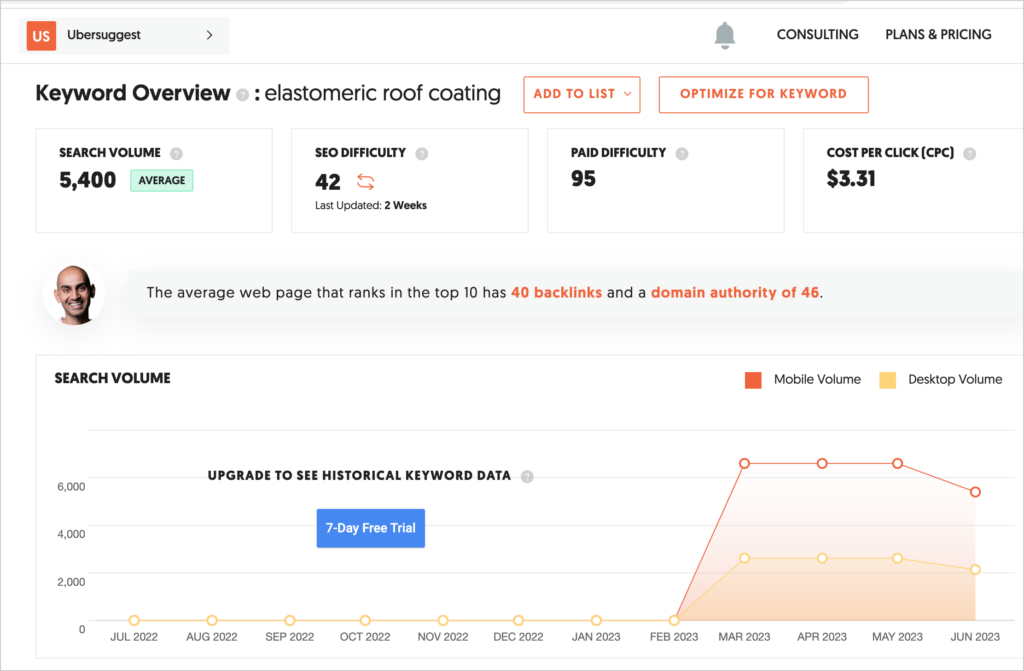
Enter a keyword into Ubersuggest and you’ll get all the options you expect from a full-featured keyword research tool.
Like Semrush and Ahrefs, this tool provides keyword ideas, content ideas, keyword difficulty score, CPC, backlinks data, search volume, and more.
And, like those leading tools, you can discover which keywords your competitor is ranking high for and target those same keywords in order to capture new traffic.
As you do your research, you can build keyword lists inside Ubsersuggest. That’s helpful for content planning especially for building topic clusters and doing competitor research.
Select features:
- Domain overview
- Keyword suggestions
- Site audit
Ubersuggest pricing: Pricing starts at $29/month for 1 domain.
Complementary Software: Link Research Tools
Austria-based Link Research Tools is prized for its granular backlinks analysis and advanced filtering.
This tool is very different from the 3 reviewed above. We’ve included it because backlinks and anchor text are ranking factors, and the tool is complementary to full-featured keyword research tools.
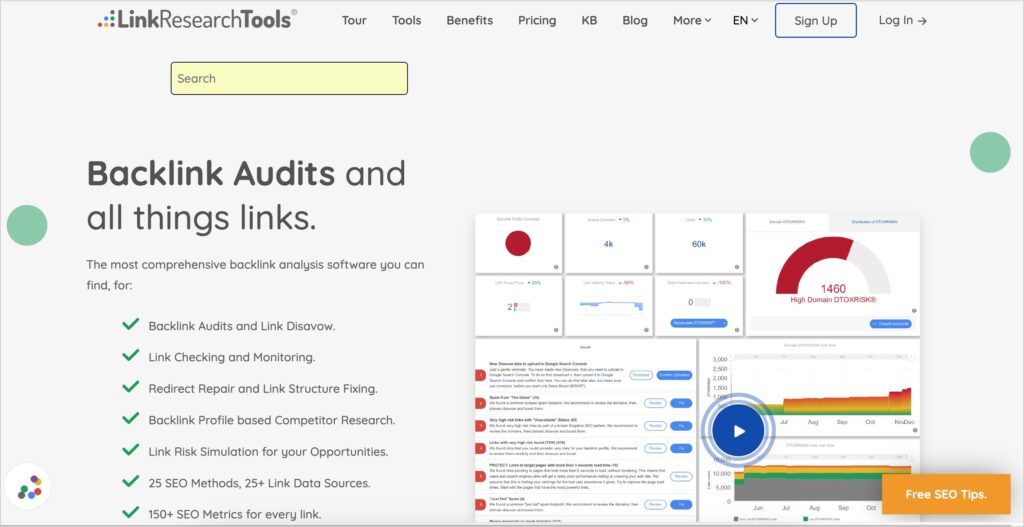
It’s arguably the most sophisticated tool available for backlinks audits, and some of the metrics are unique to Link Research Tools.
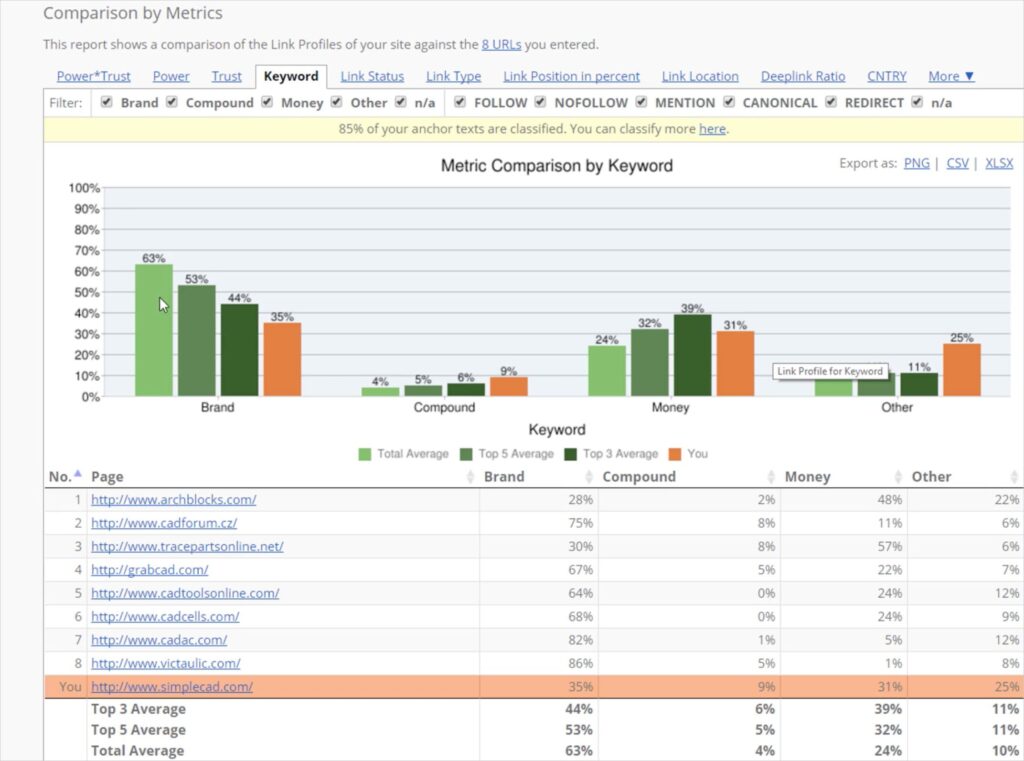
For instance, its proprietary domain DTOXRISK score alerts users to toxic backlinks and provides a way to disavow those links from within the dashboard.

The Link Simulator provides a way to forecast the future impact of link-building campaigns. This has obvious appeal to marketing and SEO agencies.
The keyword features in LRT are always related to backlinks. For example, you can use the SERP Research Tool to identify high-value backlinks to target based on niche keywords you already target.
Who it’s for: Professional marketers or agencies and those using advanced outreach techniques.
Select features:
- Competitive Keyword Analyzer
- Link Prospecting tools
- Smart filters
Link Research Tools pricing: Starts at $599/month.
Specialty Keyword Research Tools
The following keyword research tools specialize in narrow areas, like displaying questions that searchers have on a particular topic or displaying related long-tail keywords.
Or, like Globe Explorer, they’re so unique they defy categorization.
Globe Explorer: Something Totally Different
As we were preparing to publish this article, we discovered Globe Explorer, which, 10 seconds before midnight rocketed to the #1 slot on ProductHunt.
Globe Explorer is a “discovery engine” that uses an LLM (Large Language Model) to break down topics into logically ordered lists of subtopics, illustrations, and related information.
You can easily zoom in on any area to explore.
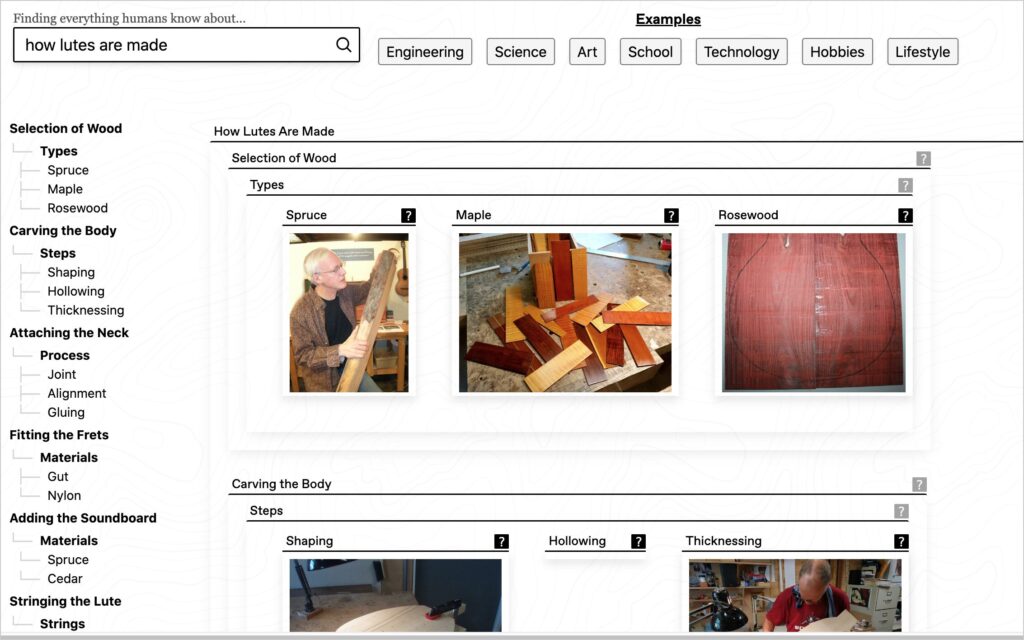
It’s hard to describe Globe Explorer because it is so different. We recommend you try it for yourself: it’s free, at least for now.
Note that it’s not described as a keyword research tool. And there’s no indication it was created for that purpose.
Yet it provides an effective (and fast) way to:
- Discover related sub-topics
- Organize an article logically
- Provide comprehensive coverage of a keyword
Unlike some top content creation tools that package keyword research functions, Globe Explorer doesn’t offer endless examples of outlines from other articles, just 1 single comprehensive outline, displayed in the left-hand margin.
It also presents all information in a single pane: no need to click through tabs.
Globe Explorer pricing: Free
AnswerThePublic: Find Related Topics and Questions
Enter a keyword into AnswerThePublic to view related topics and questions.
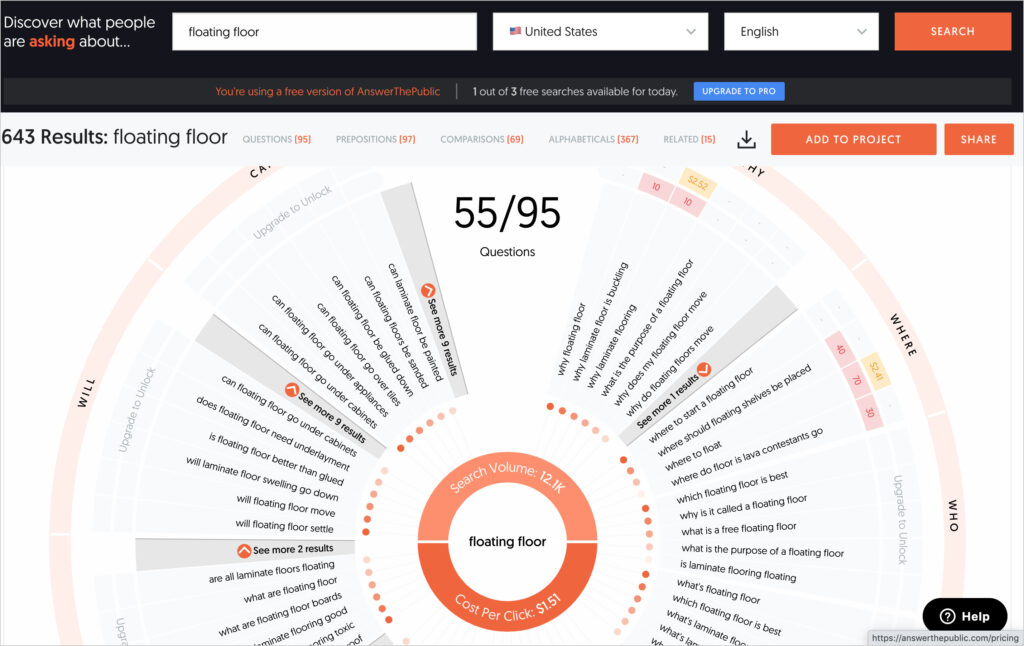
The data comes from Google’s autocomplete data.
You can do 3 searches a day with the free version of AnswerThePublic.
We found the circular display hard to read. Try it for yourself though. Bump up to the paid version to export data to a CSV file for easier analysis.
AnsweThePublic pricing: Starts at $9/month or $99 for lifetime access.
AnswerSocrates: Surface Questions by Topic
As you probably guessed from the name, AnswerSocrates is focused on questions.
Enter a keyword and you’ll get related questions that searchers have on the topic.
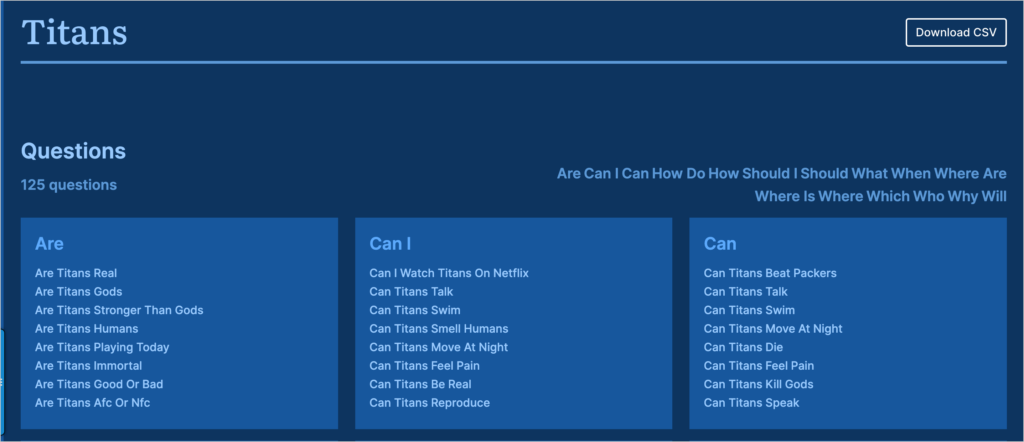
It pulls this data from Google Suggest, Google Trends, and Google’s People Also Ask questions.
The purpose of AnswerSocrates is to help users “generate more thorough articles.”
AnswerSocrates pricing: Free
AlsoAsked: Explore Questions by Geography
Like AnswerSocrates, AlsoAsked displays questions searchers have on topics.
Enter a keyword and you’ll see those questions displayed on an interactive mind map.
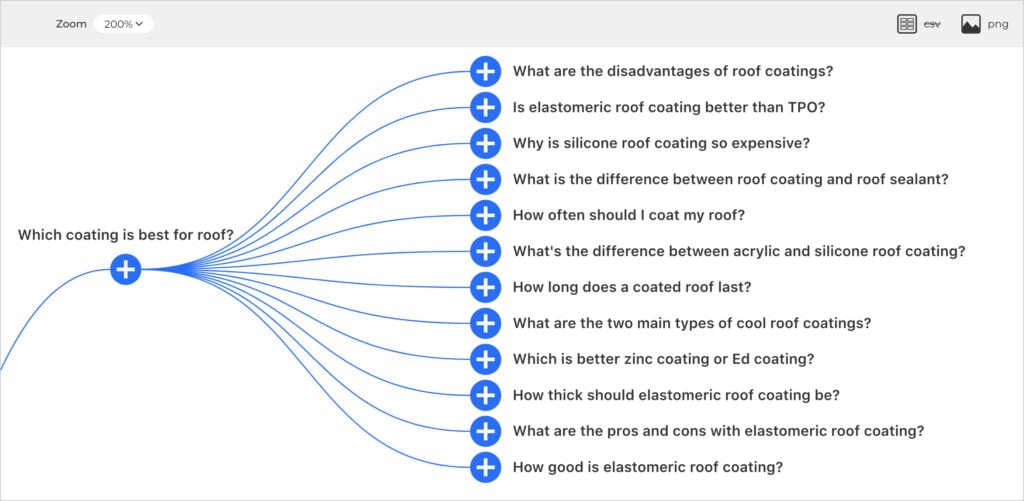
This provides an inviting and intuitive way to explore related subtopics
AlsoAsked pulls this data from Google’s People Also Ask questions.
Added plus: You can search by geography.
Like AnswerThePublic, AlsoAsked gives you 3 free searches a day. Want more? You’ll need to sign up for the paid version.
AlsoAsked pricing: Starts at $12/month for 100 searches.
TopicFinder.com: Discover Your Competitor’s Top Pages
TopicFinder helps you find your competitor’s top performing pages so you can publish content on the same topic and (hopefully) outrank them.
Their pitch is they make this process easier and more intuitive.
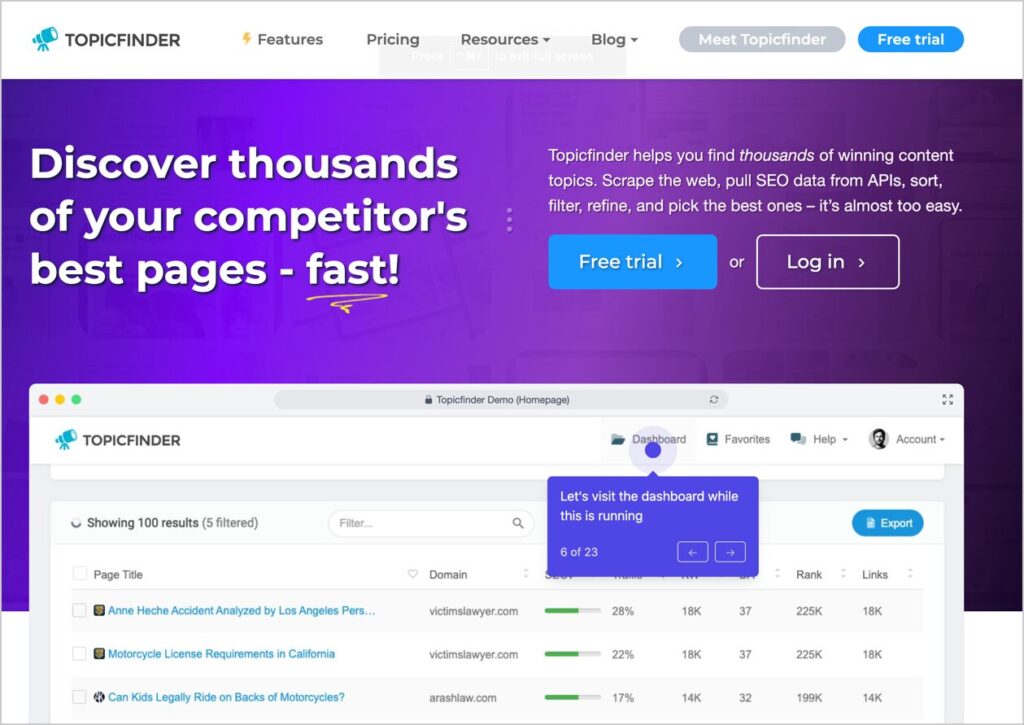
Unlike Semrush, you’re not limited to researching 4 competitors at a time.
You can filter results for topics that are easy to rank for and signal buying intent as well as by high-traffic and local content.
Topicfinder will also generate suggested outlines based on search data.
Select features:
- Advanced filters
- Custom tags
- Share direct to email
Pricing: Starts at $39/month.
Good to know: TopicFinder offers a 7-day free trial. You’ll need to enter your credit card number to get that.
Best Free Keyword Research Tools
There’s no comprehensive tool like Ahrefs or Semrush that is free.
That said, both Semrush and Ahrefs offer limited free functionality. For example, Ahrefs’ free SEO tools include:
And you can use Ahrefs for free to analyze a single site.
Semrush offers a free 7-day trial. And you can do 10 free searches a day using its Keyword Overview or Keyword Magic Tool.
Remember, Ubersuggest is similar to Ahrefs and Semrush and does provide limited free access. To get full use you’ll want to sign up for the paid plan though.
But don’t overlook Google.
Google’s Free Keyword Research Tools
Google’s free tools that can be very helpful in keyword research.
These include:
- Google Keyword Planner: Research keywords and get estimated search volume.
- Google Trends: View topic trends, by geography
- Google Search Console: Get ranking and site performance data.
Google Search Console (GSC) will show you which keywords you’re ranking for.
Connect your GSC account to Google Analytics to view this data in your GA dashboard. For instructions see How to See Google Analytics Keywords for Your Website.
Discover more free SEO tools.
Optimizing Content for Better Ranking
Keyword research tools can help you plan content to rank. Before publishing that content, it’s vital to optimize it for SEO.
And after publishing, you’ll want to see which keywords you’re ranking for.
This is where a plugin like All in One SEO (AIOSEO) comes in.
AIOSEO analyzes your web pages and provides specific action steps to help them rank higher in search results.
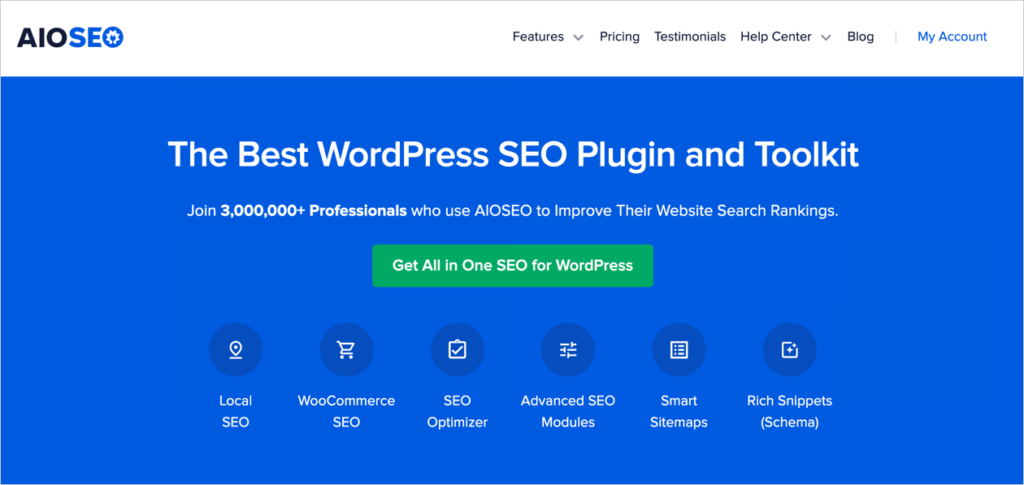
All in One SEO acts as an automated checklist, bolstering good SEO discipline.
It also automates technical SEO functions, allowing beginners to improve their rankings without learning code.
Some of the key features include:
- Automated On-Page SEO checks: See exactly how to improve SEO on a page. As you act on the recommendations, your SEO score goes up.
- Schema Generator: Easily add schema markup to pages. This can help you rank for more keywords and get more traffic.
- Link Assistant: Speed up internal linking, which can drive more traffic to your most important pages.
- Track your keywords: See which keywords you’re ranking for without leaving the WordPress editor. This SEO Statistics feature is an integration with Google Search Console.
AIOSEO’s SEO Statistics will also alert you to any rankings that are slipping. This helps users prioritize which content to improve.
In addition, you can view the impact of Google algorithm changes on your rankings.
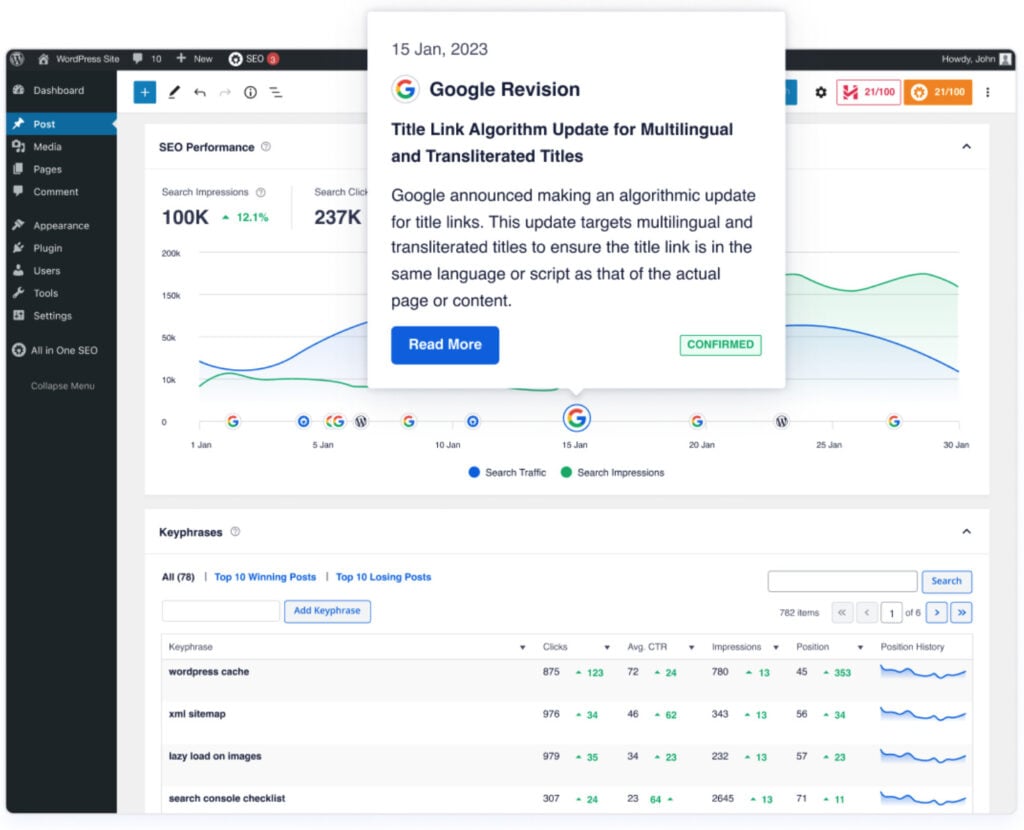
Caption: Above: A view of the Google Search Console integration available in the Elite version of All in One SEO (AIOSEO).
All in One SEO is an established plugin with thousands of 5-star reviews on WordPress.org. Currently, over 3 million site owners are using the plugin.
All in One SEO pricing: Starts at $49.60/year.
Q&A Related to Keyword Research Tools
Now that we’ve covered a variety of keyword research tools, you probably have questions.
We’ve answered some of the most common ones below. Feel free to add your question in the comments below this article.
How can I learn how to do keyword research?
To learn how to do keyword research, first learn what search intent is and how to use Chrome Incognito to do basic research. Read about these two things in our article on SEO secrets.
Next, read this beginner’s guide to keyword research. And discover how to find keywords that are easy to rank for.
What is a seed keyword?
Seed keywords are broad topics (also called short-tail keywords) and typically contain 1-2 words. Examples of these broad topics are “car insurance,” “healthy eating,” and “keyword research.”
Which is better: Ahrefs vs Semrush?
To determine whether Ahrefs or Semrush is “better,” consider which interface and feature set you prefer. To choose between the two, we recommend that you try both out.
After Choosing a Keyword Research Tool
Now that you have quality options for keyword research tools, what’s next?
Explore the role of backlinks in revenue or learn more about paid links. Both of these topics are related to content and SEO.
Then browse our list of the best SEO Chrome extensions.
Consider using topic clusters to accelerate your goals. And don’t forget to plan to capture leads.
Join us on our YouTube Channel for easy-to-follow WordPress SEO tutorials. And follow us on social media at X (Twitter), LinkedIn, or Facebook to stay in the loop.
Disclosure: Our content is reader-supported. This means if you click on some of our links, then we may earn a commission. We only recommend products that we believe will add value to our readers.
